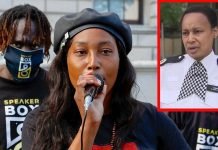George Washington statue in portland was toppled, then covered in burning U.S. flag
The George Washington statue was toppled by protesters in Portland, Oregon, on the night before Juneteenth, which marks the day in 1865 when all slaves were freed from slavery.
Juneteenth started as a Texas state holiday but is now celebrated annually throughout the United States, the date commemorates the Union army general Gordon Granger announcing federal orders in the city of Galveston, Texas, on June 19, 1865, proclaiming that all slaves in Texas were now free.
A U.S. flag was seen burning at the head of the statue before it was toppled using a rope. Another U.S. flag was seen burning over the statue after it was toppled on the ground, according to video footage and images shared on social media.
George Washington is down. #Portlandprotest #statue #blacklivesmatter #PDXprotests #pdx #oregon #blm #acab #pdx #georgewashington #flagburning#StatuesMustFall pic.twitter.com/cDAxoSVS52
— Garrison Davis (Teargas Glutton) (@hungrybowtie) June 19, 2020
Understanding the past: A little history always helps.
Amid the ongoing protests following the killing of George Floyd, many Statues across the United States world have come under scrutiny, In the U.S. these have specifically focused on those of Confederate generals who fought to keep slavery in the country.
However, people are closely examining history. The connection of slavery to any statue is bringing about protest and criticism.
Now figures like George Washington and Thomas Jefferson have also come under scrutiny in recent weeks, as they both owned slaves.

Universal History Archive/Universal Images Group/Getty Images
George Washington was a Founding Father of the United States and a slave owner who became uneasy with the institution of slavery but only provided for the emancipation of his slaves after his death. Slavery was ingrained in the economic and social fabric of colonial Virginia, and Washington inherited his first ten slaves at the age of eleven on the death of his father in 1743. In adulthood, his personal slaveholding grew through inheritance, purchase and natural increase. In 1759, he gained control of dower slaves belonging to the Custis estate on his marriage to Martha Dandridge Custis.
Washington’s early attitudes to slavery reflected the prevailing Virginia planter views of the day and he demonstrated no moral qualms about the institution. He became sceptical about the economic efficacy of slavery before the American Revolutionary War. Although he expressed support in private for the abolition of slavery by a gradual legislative process after the war, Washington remained dependent on slave labor. By the time of his death in 1799 there were 317 slaves at his Mount Vernon estate, 124 owned by Washington and the remainder managed by him as his own property but belonging to other people.
On numerous occasions, people enslaved by the Washington household ran away in an attempt to regain their freedom.
Mount Vernon’s enslaved community took opportunities, when possible, to physically escape their enslavement. For example, in April of 1781 during the American Revolution, seventeen members of the Mount Vernon enslaved population—fourteen men and three women—fled to the British warship HMS Savage anchored in the Potomac off the shore of the plantation.
In other instances, members of the enslaved community who were directly connected to the Washingtons either attempted to or were successful in their escape plans. These individuals included Washington’s personal assistant Christopher Sheels, whose plan to escape with his fiancée was thwarted; the family cook Hercules; and Martha Washington’s personal maid Ona Judge, both of whom escaped successfully.
While it is said he supported abolition in theory, he never tried it in practice. His plantation, his wealth and his position in society depended on enslaved labourers. When one of Martha’s enslaved workers fled to freedom in 1796, Washington spent the last three years of his life trying to force her to return.
Washington was a demanding master. He provided his slaves with basic food, clothing and accommodation comparable to general practice at the time, which was not always adequate, and with medical care. In return, he expected them to work diligently from sunrise to sunset over the six-day working week that was standard at the time. Some three-quarters of his slaves labored in the fields, while the remainder worked at the main residence as domestic servants and artisans. They supplemented their diet by hunting, trapping, and growing vegetables in their free time, and bought extra rations, clothing and housewares with income from the sale of game and produce.
Slaves built their own community around marriage and family, though because Washington allocated slaves to farms according to the demands of the business without regard for their relationships, many husbands lived separately from their wives and children. Washington used both reward and punishment to encourage and discipline his slaves but was constantly disappointed when they failed to meet his exacting standards. They resisted enslavement by various means, including theft to supplement food and clothing and as another source of income, by feigning illness, and by running away.
Washington’s first doubts about slavery were entirely economic, prompted by his transition from tobacco to grain crops in the 1760s which left him with a costly surplus of slaves. As commander-in-chief of the Continental Army in 1775, he initially refused to accept African-Americans, free or slave, into the ranks, but reversed this position due to the demands of war.
The first indication of moral doubt appeared during efforts to sell some of his slaves in 1778, when Washington expressed distaste for selling them at a public venue and his desire that slave families not be split up as a result of the sale. His public words and deeds at the end of the American Revolutionary War in 1783 showed no antislavery sentiments. Politically, Washington was concerned that such a divisive issue as slavery should not threaten national unity, and he never spoke publicly about the institution. Privately, Washington considered freeing all the slaves he controlled in the mid-1790s, but could not realize this because of his economic dependence on them and the refusal of his family to cooperate. His will provided for the emancipation of his slaves, the only slave-owning Founding Father to do so.
Because many of his slaves were married to Martha’s dower slaves, whom he could not legally free, Washington stipulated that, with the exception of his valet William Lee, who was freed immediately, his slaves be emancipated on the death of Martha. She freed them in 1801, a year before her own death, but her dower slaves were passed to her grandchildren and remained in bondage.
Support Independent Journalism Today
Our unwavering dedication is to provide you with unbiased news, diverse perspectives, and insightful opinions. We're on a mission to ensure that those in positions of power are held accountable for their actions, but we can't do it alone. Labour Heartlands is primarily funded by me, Paul Knaggs, and by the generous contributions of readers like you. Your donations keep us going and help us uphold the principles of independent journalism. Join us in our quest for truth, transparency, and accountability – donate today and be a part of our mission!
Like everyone else, we're facing challenges, and we need your help to stay online and continue providing crucial journalism. Every contribution, no matter how small, goes a long way in helping us thrive. By becoming one of our donors, you become a vital part of our mission to uncover the truth and uphold the values of democracy.
While we maintain our independence from political affiliations, we stand united against corruption, injustice, and the erosion of free speech, truth, and democracy. We believe in the power of accurate information in a democracy, and we consider facts non-negotiable.
Your support, no matter the amount, can make a significant impact. Together, we can make a difference and continue our journey toward a more informed and just society.
Thank you for supporting Labour Heartlands











